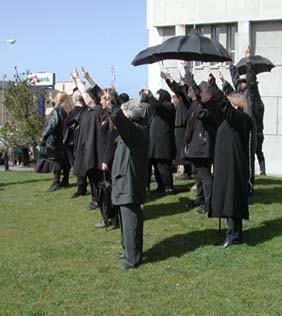|
 
COVER
STORY | GARDEN | GOOD NEWS | CALENDAR
March 20, 2003
Rush
to judgment?
The DA's case against
PL is getting slammed before it reaches court
by
KEITH EASTHOUSE & ANDREW EDWARDS
AT ONE POINT DURING LAST WEEK'S
STORMY of the Humboldt County Board of Supervisors, County Counsel
Tamara Falor tried to get the five supervisors back on point.
The focus here, she said, should
be on the liability that might arise should the board approve
District Attorney Paul Gallegos' request to bring in a San Francisco
Bay Area firm to help in his lawsuit against the Pacific Lumber
Co.
The reminder fell largely on
deaf ears. Roger Rodoni had set the tone early on when he wondered
whether the lead lawyer for the firm, Joe Cotchett, would want
a park named after him after he put Pacific Lumber out of business.
Bonnie Neely said flatly, almost impatiently, that she had serious
doubts about the merits of Gallegos' case -- a sentiment that
was echoed later on by Jimmy Smith. Throughout, the newest supervisor,
Jill Geist, had a lot of questions, not all of them terribly
relevant.
Only John Woolley seemed to
recognize the obvious: that the emotional, overheated atmosphere
that prevailed that day in the Supervisors' chambers -- packed
as it was with agitated loggers and a much smaller number of
environmentalists -- was not an ideal atmosphere in which to
make a decision. The board, Woolley suggested, needed more time
to chew on the proposal. He made a motion to reconsider it at
the next meeting, March 25. It died for lack of a second.
Neely's motion to deny Gallegos'
request, already on the table, was then voted on. It passed on
a 4-1 vote, with Woolley the odd man out.
So ended one of the more contentious,
and perhaps fateful, supervisors' meetings in memory. The upshot
was that Gallegos and Assistant District Attorney Tim Stoen,
the lawyer in charge of the case, are on their own. While Pacific
Lumber has large legal resources at its disposal, the DA will
have to rely on his own staff and whatever resources he can bring
to bear with his $2.7 million budget.
As is well known by now, the
DA is accusing Pacific Lumber of concealing critical information
during the 1999 Headwaters negotiations. They say the deception
enabled the company to log as many as 100,000 redwoods on unstable
slopes that it otherwise wouldn't have been able to get at. They
are seeking as much as $250 million in damages.
Gallegos and Stoen could come
back before the Supervisors and try again to win their approval
to enter into a contractual agreement with the Cotchett firm.
But barring some unforeseen development that would enhance the
case before it goes before a judge, there doesn't seem to be
much point. Geist, perhaps, might vote differently, but Smith,
Rodoni and Neely clearly have their minds made up.
While Gallegos and Stoen put
a brave face on things last week, vowing to push ahead, the fact
of the matter is that they lost the services of a firm that has
extensive expertise in precisely the field of law they are litigating
in the PL case: corporate fraud.
Referring to a high-profile
savings and loan case in which Cotchett won a $1.7 billion settlement,
Stoen said, not without a trace of bitterness: "That's the
kind of legal talent turned down by the board."
An influential
letter
To a large extent, Gallegos
and Stoen were done in by a letter from the California Department
of Fish and Game.
Addressed to Stoen, it arrived
in the DA's office on March 10, the day before the supervisors'
meeting. So late did it arrive that Stoen didn't even see it
until the next morning, when he was about to go before the board.
The supervisors also received copies.
When Stoen read it, and saw
the assertion that "there are errors in the facts presented"
in the DA's case, it didn't make his day, to put it mildly. "I
felt blindsided," he said later.
The letter was a major reason
the supervisors voted not to engage the services of Cotchett's
firm -- despite the fact that the letter said nothing about the
issue before the board, the hiring of outside counsel.
"In terms of hiring outside
counsel, that's not our business," said Fish and Game Conservation
Program Manager Mark Stopher, speaking from his Redding office
a couple of days after the meeting. "We're not in a position
to decide if the DA needs help or not."
Supervisor Smith said that in
discussions with Fish and Game Regional Manager Don Koch and
CDF Director Andrea Tuttle the weekend before the meeting, and
through reading material forwarded by their attorneys, he had
come to the conclusion that the county would be put at significant
risk if the Cotchett firm was hired.
"[The California Departments
of Forestry, and Fish and Game] said they were going to step
up to the plate [to defend PL]," Smith said in an interview
last Thursday. "I don't think it was ever perfectly clear
what the cost could be to the county to take on the state and
federal government, henceforth my vote was no."
It may sound like Smith was
second guessing the DA on the merits of bringing a fraud case
against PL. Not so, Smith said.
"If the DA chooses, and
I believe him to be a man of good character, he can make that
choice: that's his domain. I would never, ever second guess him
on that."
Why did Fish and Game comment
on pending litigation (in which its representatives might be
called to testify) in the first place?
Stephanie Tom Coupe, senior
staff counsel with Fish and Game and the author of the letter
to Stoen, said the department wanted to make sure he knew that
Fish and Game was already defending the Headwaters deal in a
legal challenge brought by the Environmental Protection Information
Center, a Garberville group that has long been a thorn in PL's
side.
"We wanted him to understand
that," Coupe said in a telephone interview from her Sacramento
office. "We tried to communicate that we wanted to avoid
a situation in which we would be testifying against Humboldt
County."
According to Stopher, the department
sent the letter because Stoen wasn't listening to reason in their
first and only meeting on March 7, the Friday before the supervisors'
meeting.
"We (Fish and Game) came
away from that not sure whether or not they were interested in
hearing what we had to say," Stopher said. "I thought
maybe Mr. Stoen was already vested [in the case] and wouldn't
adequately consider our comments if they were only put verbally."
A Fish and Game source said
Stoen became hostile when factual errors in his 45-page legal
complaint were spelled out at the meeting.
Two subsequent conference calls
on the 13th and 18th were called off by the DA's office without
any reason given.
"My sense is that he considers
us now to be the enemy," Stopher said.
The target was
Reid
The factual information recounted
in the letter doesn't go to the heart of the case, alleged fraud
committed by PL. But it does attack some important peripheral
points.
The suit alleges that PL concealed
information contained in a report on the Jordan Creek watershed,
located above Humboldt Redwoods State Park, and as a result successfully
persuaded then CDF Director Richard Wilson to approve a less
stringent set of logging restrictions known as "Alternative
25."
That alternative, as well as
the one Wilson originally chose, "Alternative 25a,"
are part of a key document in the Headwaters deal, the Sustained
Yield Plan, which imposes limits on PL's logging rates over the
next 100 years.
Coupe's letter stated that "The
CDF director's decision to approve Alternative 25 did not provide
additional access for PL to harvest timber on unstable areas.
It did provide the ability to harvest additional timber from
portions of the ownership which are not unstable."
If that's true, it cuts Gallegos'
case off at the knees because he's alleging that PL's deception
enabled it to access timber in areas prone to sliding.
But Coupe's statement conflicts
with one contained in a letter signed by two high-ranking officials
of the U.S. Fish and Wildlife Service and the National Marine
Fisheries Service. Dated Feb. 27, 1999, right at the time when
Wilson was being pressured to approve Alternative 25, the letter
said the following: "According to information received from
PL, most of the difference in available harvest volume in the
two alternatives is derived from the amount which can be harvested
in mass wasting areas of concern." In other words, unstable
areas.
Alternative 25, it turns out,
does indeed allow for selective logging on unstable slopes if
a geologist can figure out a way to make it work without producing
undue amounts of sediment. Alternative 25a prohibits logging
on unstable slopes, plain and simple.
So the DA's complaint has merit?
That would seem logical, were
it not for another Headwaters document, the Habitat Conservation
Plan -- designed to protect endangered species -- which trumps
the Sustained Yield Plan. The HCP does not allow harvesting on
slopes that have more than a high risk of producing excess sediment.
So the DA's case doesn't have
merit?
That, too, would seem logical
were it not for another possibility: the HCP itself is flawed.
According to Ken Miller, a vehement PL critic, there is disagreement
to this day, even with the restrictions imposed by the HCP, about
what constitutes a stable area and what constitutes an unstable
area. That uncertainty might have been avoided had the work of
Leslie Reid, a leading expert on the cumulative impacts of logging,
carried more weight. Reid, of the U.S. Forest Service's Redwood
Sciences Laboratory in Arcata, studied the Bear Creek watershed
immediately adjacent to the Jordan Creek basin in the late 1990s.
She ended up recommending a methodology to determine sustainable
logging levels that Pacific Lumber blanched at because it was
too restrictive. It was to prevent Reid's "methodology"
from being generalized to Jordan Creek and the rest of the 211,000
acres under PL ownership that PL carried out its deception.
That, at least, is what Stoen
says in his complaint.
Public input thwarted
Stoen, for his part, essentially
called the Fish and Game letter a red herring.
"Frankly, it doesn't address
the fundamental issue," Stoen said.
Which is, he said, the apparent
fact that when Wilson ditched Alternative 25a in favor of Alternative
25, he did so not knowing that Pacific Lumber had, at the eleventh
hour, given correct data on Jordan Creek to a mid-level CDF official
in Fortuna. Had Wilson known that, he would have recirculated
a document called the Environmental Impact Report to various
state and federal agencies and to the public for input. That
input, in turn, could have led to stricter logging restrictions.
But he didn't know about the new data (the official in Fortuna,
according to Stoen's complaint, never passed it up the chain
of command) and as a result, the report was never recirculated.
Therefore, according to Stoen,
the report, which the Headwaters deal hinged on, was fraudulent.
"If the EIR was fraudulent,
then there's no right to cut any trees," Stoen said.
Stoen said he was angry that
Fish and Game chose to release its letter just before last week's
supervisors meeting. And he doesn't think that was an accident.
"It was a clever ploy to
get the supervisors nervous," he said.
Peace
march in Eureka
Photo album
ANTI-WAR PROTESTERS young and
old gathered in front of the Eureka Municipal Auditorium Saturday
for a march to Old Town in protest of a looming war with Iraq.
According to Capt. Murl Harpham
of the Eureka police, a city engineer estimated the crowd size
as 2,800 "give or take a hundred."

Veterans for Peace led the march
down I Street (above).

Planners called for silence
as the march passed the courthouse in deference to the Women
in Black gathered there (above). This proved impossible as about
40 counter demonstrators (below) shouted comments and pro-war
slogans.

Both sides carried signs and
flags, not all of them the stars and stripes. The march ended
at the Gazebo where speakers addressed the crowd, among them
Wiyot Tribal Chairwoman Cheryl Seidner, Eureka Mayor Peter La
Valle, County Supervisor John Woolley and Brian Willson from
Veterans for Peace.

 

Tree-sitters
taken down
by ANDREW
EDWARDS
PACIFIC LUMBER CO. MADE GOOD
ON ITS PROMISE TO TAKE DOWN TREE-SITTERS FROM their perches in
Freshwater this week, launching an operation that's supposed
to last several days.
On Monday long time tree-sitter
Remedy and her neighbor Wren were hauled down in a day-long operation,
involving six climbers, more than 15 Humboldt County Sheriffs
(many working on their day off), seven correctional staff from
the Humboldt County Jail to book prisoners, at least four California
Highway Patrol officers and tens of activists.
Greenwood Heights Road, an offshoot
of Kneeland Road that winds up a wooded mountainside just northeast
of Eureka, was blocked off by Pacific Lumber personnel for several
hours on Monday. The company's justification for the closure,
which involved no public notification? An encroachment permit
it had applied for last year.
The aim was apparently to prevent
activists from gathering at the base of trees that tree-sitters
occupied. But even residents were turned back. Only press, PL
workers and law enforcement were allowed.
Humboldt County Supervisor John
Woolley received about 30 angry calls from his constituents and
looked into the matter. After consulting with Public Works (which
manages county roads) Woolley concluded that the encroachment,
which was solely for logging, didn't apply to tree-sitter extraction,
and county attorneys notified PL that the barricades would have
to come down.
"It's only there for commercial
logging processes," Woolley said, adding that he was worried
about lawsuits. "You could see the future, if you're dealing
with an illegal encroachment permit."
County Counsel Tamara Falor
said PL must give Public Works two-week notice of any road closure.
Such notice was not given in this case, Falor said.
Sheriff's deputies, unaware
of the wrangling behind the scene, went to work early enforcing
the permit. They walked a group of activists that had gathered
at the base of the tree down the road, until one of the more
vocal ones, Alexander Carpenter, aka Four Winds, 26, laid down
in the road and was arrested.
"I got so tired of being
pushed down the hill by billy clubs I laid down and let them
arrest me," Carpenter said. "I was a guilty man there."
Carpenter was back on the scene
as soon as he got out of jail.
The climbers, led by the always
cheerful Eric Schatz of Schatz Tree Service, threw ropes into
the trees and went up after the tree-sitters, three climbers
per tree. Hours passed and nothing happened. A cold wind blew.
After four o'clock the road
was opened and activists began to stream back. They were herded
past the tree-sits, contained by a wall of deputies.
Around 5 p.m., after hours of
apparently pleasant, if fruitless, coaxing by Schatz, Remedy
was brought down; they had cut the chains that anchored her in
her lock box.
"If the chains had been
shorter they wouldn't have been able to do that. It was kind
of a faux pas on my part," Remedy said in an interview
Tuesday.
The mood was emotional. People
were crying. When Remedy appeared and was driven away in a cop
car the crowd surged forward, blocking the road. Deputies forced
them back. Finally they sat down on the road and chanted.
When Wren came down things got
ugly. Activists were shoved back by batons and the crowd was
pepper-sprayed. Several people were arrested.
That night, both trees were
reoccupied, Remedy's by three women and Wren's as well. In the
case of Wren's tree, activists reportedly climbed up PL's own
rope, which had been left overnight.
The next day the climbers came
to the heavily populated lower village but were only successful
in removing one tree-sitter, Annapurna. She was unhurt. Her tree
was immediately reoccupied by tree-sitters travelling high up
on traverse lines.
In an apparent gesture of frustration
at the end of the day, PL employees surrounded the tree, still
occupied, and girdled it with a chainsaw, removing the bark from
around the base of the tree to kill it.
Activists on the road rushed
the workers screaming that the tree was occupied, almost as if
in pain. Some scrambled to protect surrounding trees but the
workers didn't do anything more.
After two days, three tree-sitters
had been arrested, three trees reoccupied, one road reopened,
one tree girdled, 11 ground-based activists arrested. Stay tuned.
The battle is supposed to continue all week.
Biohazard
scare in McKinleyville
by BOB
DORAN
Postman Mick Abarr didn't like
what he found when he opened the mail dropbox in the McKinleyville
Shopping Center at 3:30 Monday afternoon. The letters and boxes
inside were covered in powder.
When he notified his supervisor,
Gary Scott, he was told to "secure all mail; take it to
a safe location."
With war on the horizon and
rumors of bioterrorism rampant, it's not surprising Abarr was
uneasy; once he and his wife, Lynda -- also a postal employee
-- started unloading the powdered mail their fears increased.
The contents of the mailbox included as many as 15 boxes marked
"biohazard."
The couple took the bag of mail
to the McKinleyville Post Office and awaited further instructions.
After consulting Postmaster
Buck Hoffman, Scott called 911 and before long assorted response
teams started arriving: sheriff's deputies, fire department trucks,
an ambulance. Lynda heard that the FBI was there, but no one
from the bureau talked to her. The street behind the post office
was cordoned off to create a workspace for the Arcata Fire Department's
haz-mat (hazardous materials) response truck, a mobile lab capable
of analyzing materials in the field -- up to a point.
With all the activity, McKinleyville's
rumor mill was buzzing. At a gas station down the street, customers
said that they had heard there was a bomb at the post office.
Haz-mat team leader Tod Reddish
supervised the testing, which took hours, while the Abarrs stood
by shivering in the cold wondering what the powder might be.
They had been sprayed down after the dust came in contact with
their skin, and Lynda was not allowed back into the "contaminated"
post office to get her coat or the keys to her car.
On closer examination the biohazard
boxes were found to be medical specimens. Mick Abarr assumed
they were blood and urine. The mailing address was a toxicology
lab in New York. There were no broken boxes or torn letters and
no other indication that the powder came from anything in the
mailbox.
By the time the haz-mat team
finished its work, night had fallen and a full moon was rising.
The verdict: The white powder probably came from a fire extinguisher
discharged into the mailbox from outside. Tests for ph balance
indicated that "the chemicals were consistent with those
typically found in fire extinguishers," according to Reddish.
He admitted that their testing equipment could not determine
if the material was something like anthrax, but it seemed unlikely.
A sample of the powder was to
be sent to the County Health Department. Reddish's best guess
was that it would be discarded without further analysis. The
Abarrs were free to go.
Did they rest easy that night?
Don't bet on it.
Fund
for Gallegos' PL case
Stymied in his attempt to hire
an outside law firm for his suit against the Pacific Lumber Co.,
District Attorney Paul Gallegos may get a bit of help from local
residents.
A Redway man has started a fund
to help defray the county's legal expenses in connection with
the lawsuit. Jared Rossman, a landlord and property manager,
sent out an e-mail urging people to "put your money where
your mouth is" and donate to his "Citizens' Fund for
Equal Justice."
"I was so upset by the
way the Board of Supervisors handled this," he said. They
could have shown support for "this independent DA."
Instead, they missed an opportunity. "If the county officials
are going to drop the ball then the citizens are going to have
to pick it up," he said. "When the law is applied evenhandedly,
the truth will win out, and that's what America was built on."
The fund was established at
the Community Credit Union of Southern Humboldt in Garberville.
It was unclear at press time whether it is legal for a citizens'
group to earmark private donations for use by the county in a
specific lawsuit.
Meanwhile, another local man
has started a group called the Alliance for Ethical Business,
a "citizens advocacy group concerned about corporate crime,"
said founder Richard Salzman. He said his group would support
Gallegos' efforts to discover the truth in the Pacific Lumber
case, and is organizing an event for April 9 at the Arcata Community
Center in which Gallegos and Assistant DA Tim Stoen will answer
questions about the lawsuit.
Teachers
may lose jobs
Last week 132 full- and part-time
public school teachers in the county-- including nearly 40 in
Eureka -- were notified that they might be laid off due in part
to the state's massive budget crunch.
"We're taking a conservative
look at the budget," said Janet Frost, superintendent of
county schools, explaining that it's possible "many these
teachers will be kept."
Many districts are looking for
other ways to cut the costs and still serve the kids, she added.
The notifications aren't final,
but according to law the county had to notify teachers they might
be out of work next school year by March 15. The final numbers
won't be known until the state's budget is finalized by the Legislature
later this year.
The state budget crisis has
necessitated a $2 million cut in the budget for Humboldt schools
in the coming fiscal year. The loss of another $2 million is
due to expected declines in enrollment.
Gas boycott
bogus
A widely circulated e-mail chain
letter advising readers to "stop paying for terrorism"
by boycotting certain gasoline stations is off base, according
to the U.S. Department of Energy.
The e-mail lists the amounts
of Middle Eastern crude oil purchased by various companies in
fiscal year 2000-01, using figures from the Department of Energy.
Shell, at almost 206 million barrels, is No. 1. Other companies,
such as Conoco and BP-Phillips, are cited as having purchased
no Middle Eastern crude.
But the figures are misleading,
according to an advisory on the Department of Energy's website:
"The fact that a given
company imported crude oil or gasoline does not mean that those
particular imports will end up being sold to motorists as that
company's brand of gasoline," the website advises. Furthermore,
"the origin of the crude oil that a refinery processes is
determined by market economics at a given time and may change
from month to month or even day to day."
KEKA pulls
Dixie Chicks
The North Coast's country music
stations felt the heat last week when singer Natalie Maines of
the Dixie Chicks told a London audience that she was "ashamed
the president of the United States is from Texas."
Angry listeners urged both Big
Red 92.3 and KEKA 101 to stop playing the mega-popular country
group, which won three Grammys last month for their disc, "Home."
KEKA responded. "We pulled
them completely for a few days" from the eight hours a day
of local programming, said General Manager Hugo Papstein. "We
got a lot of calls, all negative."
Big Red 92.3 got dozens, if
not hundreds, of calls on both sides of the issue, said Rollin
Trehearne, the station's morning host. "We continue to take
the stance that we're not going to censor them, because if we
censor them, somebody would have the right to say we should censor
someone else," he said.
The Jones Satellite Network,
which provides about 75 percent of Big Red's programming, may
have reduced the number of times the Dixie Chicks entered the
rotation, Trehearne said.
Maines has since backed off
from her original statement, apologizing to Bush for her "disrespectful"
remark.
Papstein puzzled over why she
would even make the remark. "They're country singers --
they probably don't know a hell of a lot about what's going on."
Trinidad
struggling
The city of Trinidad made a
few changes in the way it does business last week, as it struggles
to deal with severely depleted fiscal reserves.
The city is slashing the workload
of the city attorney, planner, engineer and accountant. In addition,
no new projects will be going forward at least until the current
fiscal year is over.
So far no jobs are in jeopardy.
In the last 10 years the city's
general fund reserves have shrunk from more than $300,000 to
about $35,000.
Banner year
ends
A banner year for Humboldt State
University men's basketball came to a sudden close last Saturday
when the Jacks came up short against Cal State San Bernardino.
They lost the game 68-80, closing out a 23-6 season that they
had begun as the top-ranked NCAA Division II team in the nation.
The defeat came in the second
round of the NCAA West Region Tourney held in Hawaii.
The Jacks had defeated Hawaii
Hilo 102-81 in the first round.
This is the second year in a
row that San Bernardino has knocked the Jacks out of the tournament.
COVER
STORY | GARDEN | GOOD NEWS | CALENDAR
Comments? E-mail
the Journal

© Copyright 2003, North Coast Journal,
Inc.
|